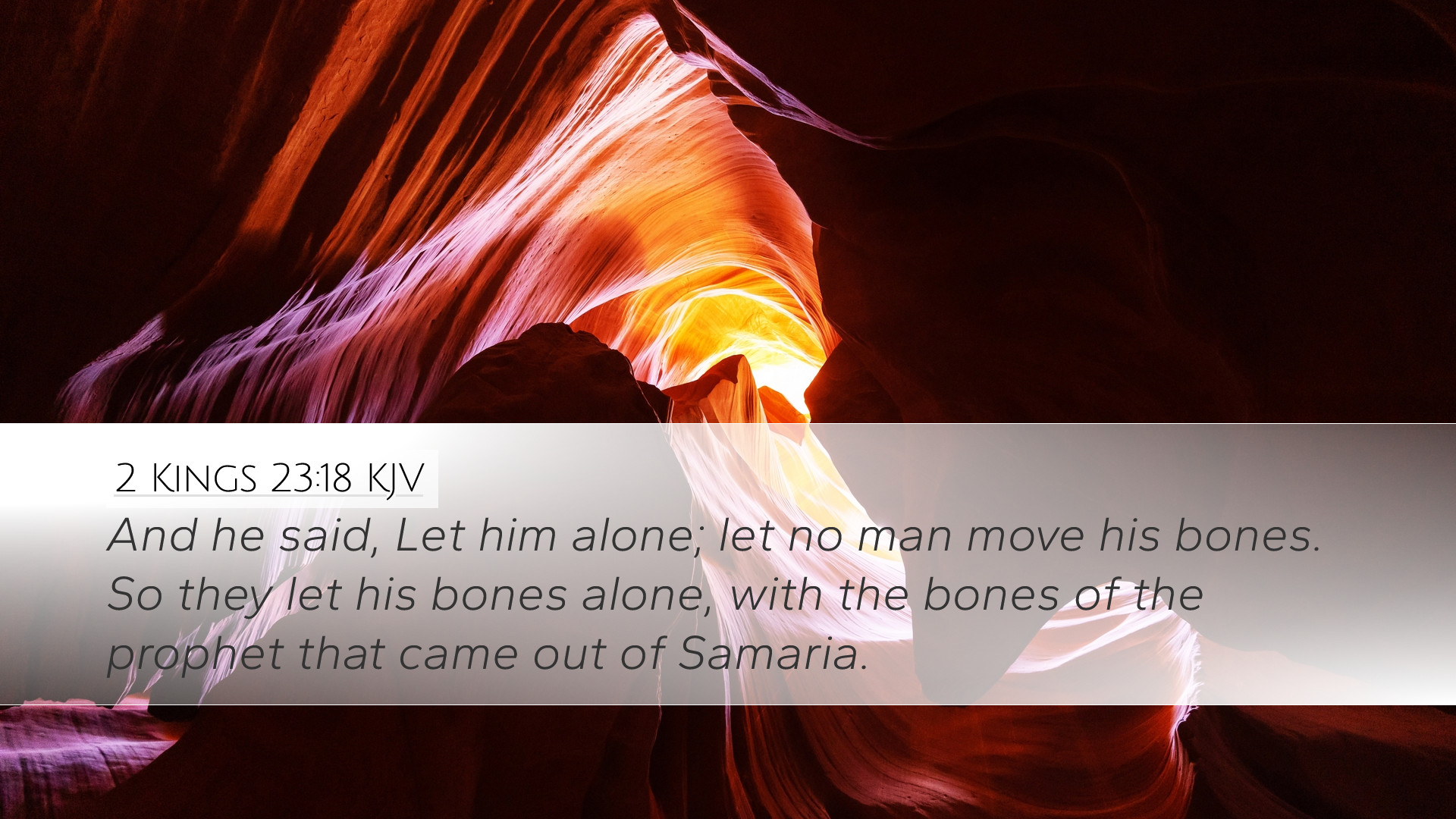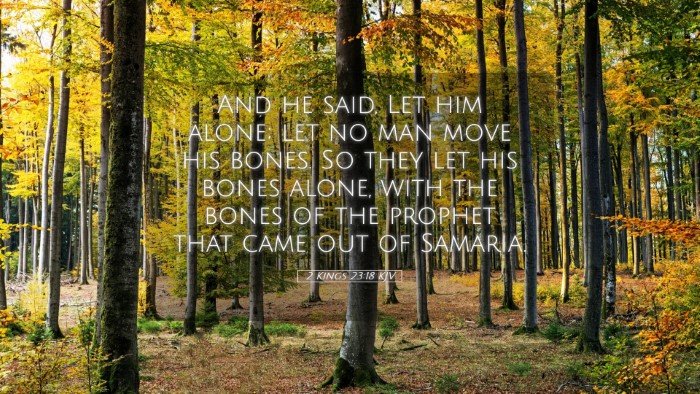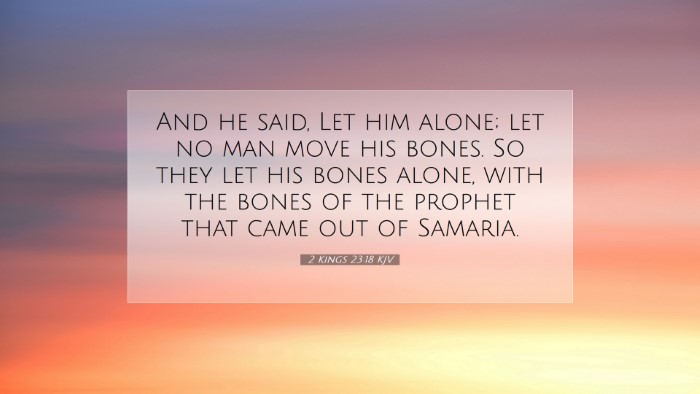Commentary on 2 Kings 23:18
Verse: "And he said, Let him alone; let no man move his bones. So they let his bones alone, with the bones of the prophet that came out of Samaria."
Introduction
This passage from 2 Kings 23:18 is a significant moment in the narrative of King Josiah's reforms and the rejection of idolatry in Judah. The context involves Josiah's zeal for restoring true worship and eliminating false gods. The verse refers to a prophet from Samaria, whose bones are permitted to remain undisturbed as a sign of respect and acknowledgment of God's hand in the prophetic voices of the past.
Historical Context
The events encapsulated in this verse occur during a pivotal time in Judah's history—a time of spiritual renewal under King Josiah. As he seeks to cleanse the land of idolatry, his reforms are influenced by the discovery of the Book of the Law. This book restores covenantal faith and demands fidelity to Yahweh alone.
Josiah's Reforms
Josiah, only eight years old at the time of his ascension, shows remarkable commitment to the Lord. His reforms included:
- Cleaning out the temple of idols.
- Reinstating the Passover as a national celebration.
- Consolidating worship practices centered around the Jerusalem temple.
In the context of these reforms, the reference to the bones of the prophet underscores the seriousness with which God’s messengers, even deceased ones, are regarded. Their messages bear weight, impacting the community long after their demise.
Commentary Insights
Matthew Henry's Commentary
According to Matthew Henry, this verse illustrates King Josiah’s regard for the prophetic office. Josiah's instruction to leave the bones of the prophet undisturbed highlights a respect for God’s servants, emphasizing that their legacy should not be tarnished by the sins of those who lived after them. Henry suggests that this act reflects the deeper theological truth that God's word and the instruments of His message should always be honored, even after their physical departure.
Albert Barnes' Notes
Albert Barnes notes that this passage emphasizes the importance of prophetic authority and the divine will behind God's messengers. Barnes explains that the king's decision to protect the prophet’s bones signifies acknowledgment of the prophet’s legitimacy and his role in guiding God’s people historically. This decision reflects a broader theological perspective where reverence for God’s word supersedes public opinion, highlighting the prophetic voice's enduring value.
Adam Clarke’s Commentary
Adam Clarke emphasizes the miraculous nature of the prophecy regarding the altar at Bethel and its fulfillment through Josiah's reforms. He suggests that leaving the prophet's bones undisturbed is both a gesture of respect and a recognition of the continuity of God’s revelation. Clarke also points out that the actions of Josiah create a link between past prophets and the current reformation, suggesting a divine orchestration of history that honors both the past and present truths of God's word.
Theological Implications
This verse encapsulates themes of respect for the prophetic tradition and divine authority. It is a reminder that God’s servants, through their messages, shape the life of the community. There are several important theological implications to consider:
- The continuity of God’s revelation: The preservation of the prophet’s bones symbolizes the continuity of God’s interaction with humanity across generations.
- The respect for divine authority: Josiah's insistence on not disturbing the prophet’s bones reflects a profound reverence for the prophetic message and its implications for God’s covenant with His people.
- The call for spiritual integrity: This moment in Scripture necessitates reflection on how current generations honor and adhere to the truth conveyed by past prophetic voices.
Application for Pastors and Theologians
This passage offers rich insights for contemporary ministry and theological reflection. Some pertinent applications might include:
- Honor the legacy of past theologians: Just as Josiah honored the prophet’s remains, contemporary leaders should respect and engage with the theological contributions of those who have gone before.
- Maintain a prophetic voice: Like the prophets of old, today's church leaders are called to be truth-tellers in their communities, ensuring that God’s messages are communicated with clarity and authority.
- Commit to reform: Josiah’s example challenges the church today to pursue reform and purity in worship and doctrine, leading with the understanding of scripture as the ultimate authority.
Conclusion
2 Kings 23:18 serves as a vivid reminder of the importance of recognizing and honoring God’s prophetic messages through history. The treatment of the prophet's bones by King Josiah articulates a deep respect for divine authority and encourages believers to maintain fidelity to God's word, both in personal practice and communal worship. The insights from respected commentators underscore the weight of this passage, calling all believers to align with God's continued revelations and to honor the legacy of those who have faithfully spoken on His behalf.


